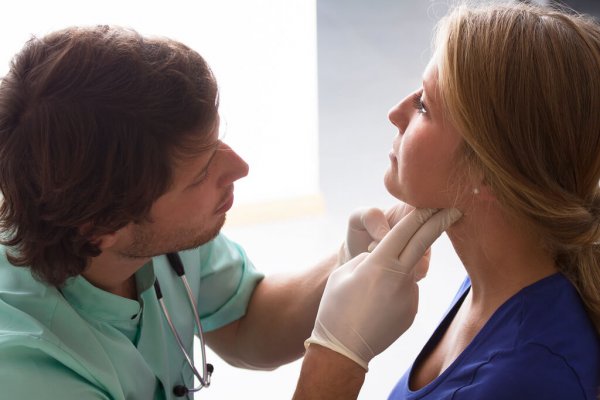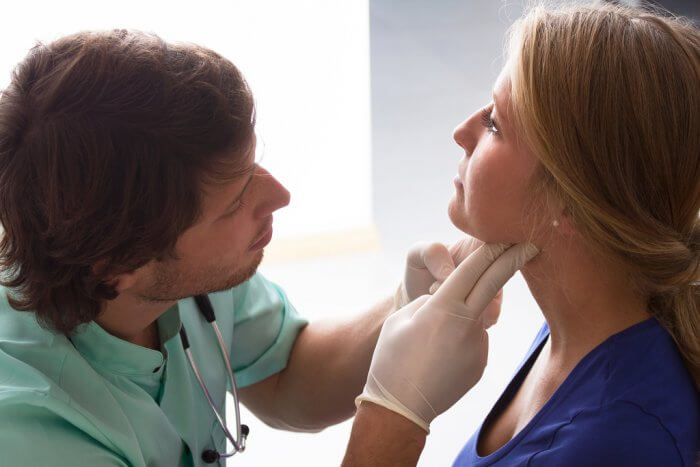Introduction
Graves’ disease, also known as parry or Basedow, is an immune disorder that causes the thyroid gland overactive. The thyroid is an important endocrine located in the neck, producing thyroid hormones that control a lot of the body’ activities. When this gland is overactive, it overproduces thyroid hormones, causing hypothyroidism.
Graves’ disease is rarely life-threatening. Although it can happen at any age and in both men and women, it is more common in women and usually starts after the age of 20.
In the article, before learning about Graves’ disease diet, let’s take a look at signs, symptoms, and causes of this condition.
What Are Signs and Symptoms of Graves’ Disease?
Common signs and symptoms of Graves’ disease include:
- Feelings of worry, anxiety, and tiredness
- Bigger chest than normal (for men)
- Frequent urination
- A lack concentration
- Increased sweat secretion
- Appetite
- Trembling
- Abnormal weight loss
- Rapid or abnormal heart rate
- Irregular menstrual cycle
In addition to the symptoms and signs above, Graves’s disease is also commonly seen with the following:
Thyroid Goiter
Thyroid goiter is a common sign and found in approximately 80% of the patients. It is usually at level 2 and has soft or solid density and mobility when swallowed.
Thyroid Eye Disease
Thyroid eye disease usually has lesions which occur in both eyes, but only 10% of cases are present on one side. The development of eye damage can be independent of the progression of Graves’ disease.
It causes mild signs and symptoms as follows:
- Torn, gritty or sandy feelings in one or both eyes
- Redness or inflammation of the eye
- Space expansion between the eyelids
- Swelling of the eyelid and tissues around the eye
- Light sensitivity
- Corneal ulcer
- Limitation of eye movement
- Vision reduction
Skin Disorders of Graves’ Disease
Skin disorders by Graves’ disease rarely happen, only in 2-3% of the patients. They include the following signs and symptoms:
- Pretibial myxedema: The skin is thick so that you cannot pinch it due to the accumulation of Glycosaminoglycan. It sometimes occurs in the entire leg and can spread to the feet. The skin is rough, yellowish or reddish.
- Pachydermoperiostosis: thickening of the skin, especially clubbing of the fingers.
- The sign of shortening fingernails and lengthen lunula.
What Is the Cause of Graves’ Disease?
Graves’ disease occurs due to abnormal activity of the immune system. At that point, the immune system attacks the tissues of the body and lead to abnormal thyroid function. It makes thyroid hormone produced more than normal. Graves’ disease can be inherited but not spread to others.
How to Treat Graves’ Disease?
You will be given beta blockers in cases of abnormal heart rate, sweating, and anxiety. Graves’ hypothyroidism can be handled by reducing the amount of thyroid hormone in the body through methods such as the use of medications, iodine radiation or surgery. However, in the case of using radiation therapy or surgery, you will have to use thyroid hormone replacement drugs lifelong.
Some eye diseases caused by Graves’ disease can be treated with iodine radiation, medications or surgery. However, the method of iodine radiation is often not effective and sometimes causes eye damage. Doctors will give you a steroid medicine to inhibit your immune system or other eye drops to reduce eye irritation or swelling. Also, use a clean cloth to cover your eyes when sleeping to prevent dryness. Your doctor will also perform other procedures or other radiation treatments to treat your eyes as needed.
In addition to the methods of the treatment mentioned above, you should have a reasonable Graves’ disease diet to limit the disease progression.
Foods You Should Add to Graves’ Disease Diet
High–Protein and High–Calorie Foods:
The most obvious manifestation of Graves’ disease is weight loss and fatigue. The cause is the metabolism is higher, burning more calories. To prevent weight loss and being exhausted, you should have a diet high in protein, rich in calories and drink more water.
You should eat soft, liquid and cold foods that are easy to digest and divided into several small meals such as watermelon, broad beans, water dropwort and lily mushroom.
You should eat a lot of fruits, mainly which contains a good source of potassium and phosphorus such as bananas and coconut water, or high-goitrogenic such as cabbages, cauliflowers, kale, and turnips.
Zinc and Calcium–Rich Foods:
When suffering from Graves’ disease, you have depleted zinc element, and your process of calcium exchange is altered as well. Consequently, Graves’ disease diet should be supplemented with foods containing these substances such as lean meats, amaranth, bok choy, spinach, bananas, and kiwis.
Foods Rich in Vitamin A and E:
Supplementing diets rich in vitamin A and E such as oranges, apples, carrots, papayas, mangos, etc. will help you fight off the fatigue symptoms of hypothyroidism.
Foods You Should Not Add to Graves’ Disease Diet
Iodine–Rich Foods:
Iodine is used by the thyroid gland for the synthesis of hormones, so you have to limit and avoid foods high in iodine such as seafood and seaweed.
Red Meat:
Red meat is high in saturated fat and cholesterol. Eating red meat when having Graves’ disease can cause heart disease and type 2 diabetes. Removing red meat in your meals can help reduce symptoms of hypothyroidism.
Milk and Dairy Products:
In some people who have Graves’ disease, their bodies cannot tolerate lactose or digest milk or dairy products. Therefore, if you usually suffer from indigestion, flatulence or fatigue after eating milk, cheese, yogurt, and ice-cream, you should limit these foods.
High–Sugar Foods:
High blood sugar can also increase anxiety levels in those who have Graves’ disease. Thus, you should limit high sugar foods such as cakes, soft drinks, jam and so on.
Spicy Spices and Stimulants:
Spicy spices such as peppers, ginger, etc. and stimulant drinks such as coffee and carbonated water will stimulate the thyroid gland to release too much thyroid hormone. It makes the body works abnormally fast, leading to generate a lot of heat, so patients are always hot and irritated. Therefore, these are foods that you need to limit.
Alcoholic Beverages:
This drink can break down energy levels and aggravate sleep problems and increase the risk of osteoporosis in patients with Graves’ disease. Therefore, you should limit or avoid alcohol, beer, cocktails and other alcoholic beverages.
Conclusion
The information provided above helps you understand more Graves’s disease and know how to take care of yourself with appropriate Graves’ disease diet. Besides, the following living habits and lifestyles will help you limit Graves’ disease progression.
- Take your medication exactly as prescribed. Missing doses will make the drug ineffective.
- Exercise daily if your doctor allows.
- Get an eye exam at least once a year or more if needed.
- Do not smoke cigarettes
If you have any questions about Graves’ disease, please consult your doctor for best treatment support.
References:
- https://carekees.com/graves-disease-diet/
- https://www.webmd.com/women/understanding-graves-disease-symptoms
Also, read: http://www.newspeakblog.com/reason-muscle-weak/


